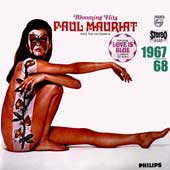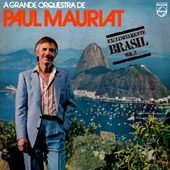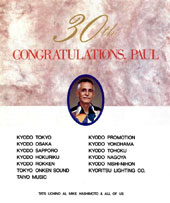INTERVIEW
Interview to Alexander Abramoff, president of Nippon Phonogram when Paul Mauriat was touring in Japan - October 2016 - Dmitry Zhoukov
PAUL MAURIAT'S MUSIC WILL ALWAYS BE WITH PEOPLE IN JAPAN
Paul Mauriat, the French master of "easy listening", was not a superstar in France unlike the top-singers such as Charles Aznavour, Mireille Mathieu or Salvatore Adamo. But he managed to become No.1 of all French artists in the United States! And his numerous recordings, especially "Love is blue", are continuing to be the one of the brightest and most attractive goods of whole French export.
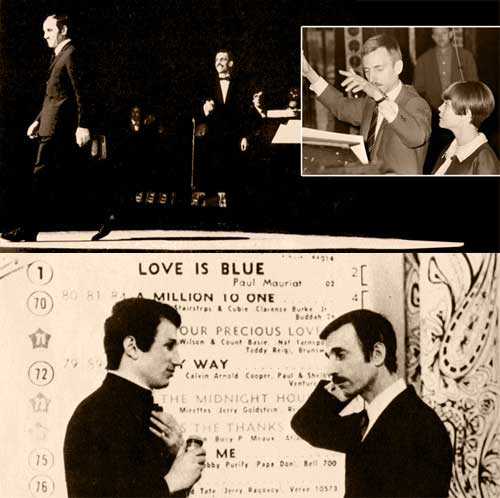
10 years ago the Maestro's friends in the world felt orphaned. Own memories about Paul kindly shared the president of the Japanese record company Nippon Phonogram / Mercury Music Entertainment since 1990 to 1999 Alexander ABRAMOFF.
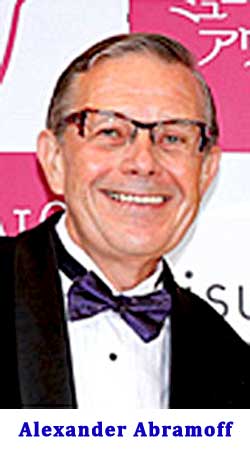 Dmitry: Dear Alexander! Do you remember how started Paul Mauriat's popularity in Japan?
Dmitry: Dear Alexander! Do you remember how started Paul Mauriat's popularity in Japan?
Abramoff: I joined Nippon Phonogram, Paul Mauriat’s record company in Japan, in 1977 and at that time he was already a big name in the country. Thus, I was not there to witness how his popularity in Japan was kicked off. The music played by the Paul Mauriat Orchestra was tagged "Love Sound" in Japan and whenever one heard the phrase "love sound", it was automatically associated with Paul and his music.
Dmitry: How large was the Japanese audience of his orchestra in 70s?
Abramoff: A good indication is that the Paul Mauriat Orchestra was doing around 30 sold out concerts throughout Japan each time the orchestra toured the country. Each venue could seat at least around 2,000 people.
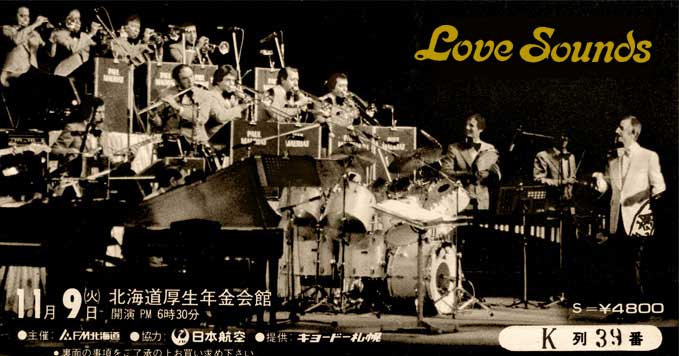
Paul Mauriat and his "love sound" could easy to fill concert halls everywhere in Japan
Dmitry: What recordings by Paul Mauriat are your favorite?
Abramoff: There are so many, but if I were asked to name a few, I would say "Love is Blue" and "El Bimbo".
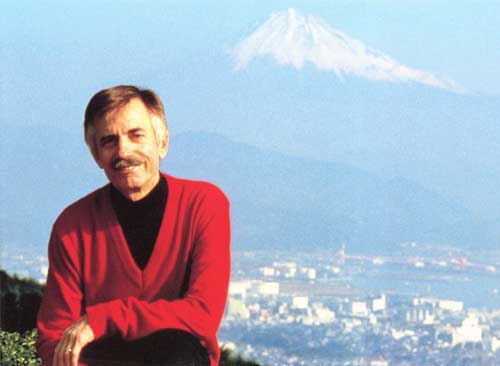
Dmitry: How you could explain the phenomenon of Paul Mauriat in Japan?
Abramoff: Paul Mauriat is the only international artist to this date who played two sold-out shows in one day at the famous Nippon Budokan, a 10,000 seater in Tokyo - nothing else better describes the phenomenon. Also, although I could walk on Champs Elysees in Paris rather freely with Paul, I could hardly walk with him on streets in Tokyo as he was surrounded by fans the moment he was recognized.
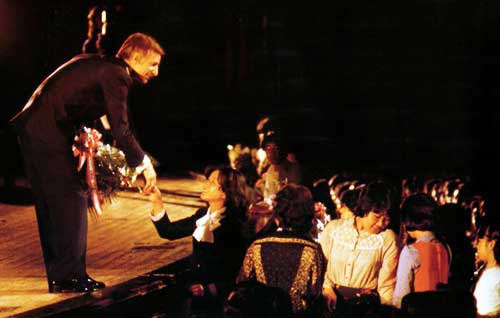 Paul Mauriat receives the flowers from his Japanese fans and whole families, Japan tour 1979.
Paul Mauriat receives the flowers from his Japanese fans and whole families, Japan tour 1979.
Dmitry: Surely, you have also contributed to its popularization as a journalist in Billboard magazine, is it not?
Abramoff: I did not really "contribute" to his popularity as a writer for Billboard, but I certainly helped to spread the news of his popularity in Japan around the world including Brazil which was his second largest market after Japan.
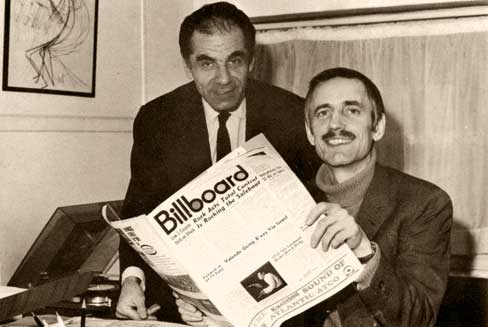 Paul Mauriat with J.J.Tilche, Director of Production for Philips Records (USA) on 27 January 1968 that "Love is blue" and album "Blooming Hits" arrived at the number of the spot on the Billboard charts
Paul Mauriat with J.J.Tilche, Director of Production for Philips Records (USA) on 27 January 1968 that "Love is blue" and album "Blooming Hits" arrived at the number of the spot on the Billboard charts
Dmitry: Do you remember your first contact with Paul?
Abramoff: My first contact with Paul was in early 70’s when I interviewed him for a Japanese music trade paper called "Music Labo" which was the sister publication of Billboard in Japan. At that time, I did the interview in French which by that time I had studied for eight years at high school and university. He was very kind in answering all my questions and I still remember how thoughtful he was about Japan and his fans in the country. It was clear that he did not mind to spend his time and efforts on the market. After I joined Nippon Phonogram in 1977, we often talked about our first encounter but spoke in English as my French was weakening. The last time I practiced my French with Paul was at his farewell party which Nippon Phonogram, or Mercury Music Entertainment as it was call then, hosted for Paul in Osaka after his last concert in Japan. Paul liked my speech in French.
Dmitry: Please, tell about your work with him at that time.
Abramoff: It was always a pleasure to work with Paul, but I must mention the wonderful manager he had beside him – late Valentin Coupeau. Valentin was the gentleman in every meaning of the word. He was at a mixing console at all of Paul’s concerts working on the sound. Valentin made it easy and pleasant to deal with Paul for all of us – i.e. people at a record company, concert promoters, press, etc. Without Valentin, I am sure Paul could not enjoy the popularity he enjoyed in Japan.
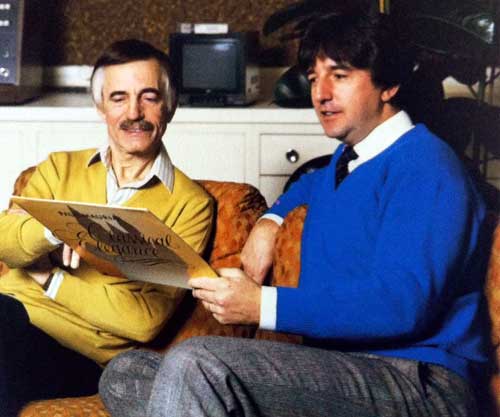
Paul Mauriat and Valentin Coupeau, his manager and co-producer, discuss a newly released laser-disc "Classical Elegance" in Paris, 1985
Dmitry: What a person and an artist you recollect Paul?
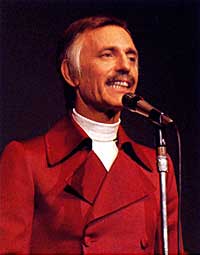 Abramoff: Paul loved Japan and his fans in the country. For every tour of the country, he prepared a five minute speech in Japanese which he memorized thoroughly and gave at the beginning of each of his concert throughout the tour. This of course moved hearts of people in Japan. Also, every time the orchestra toured Japan, they played Japanese hits which were popular in the country then. The hits were arranged in Paul’s style of "love sound" and, when they were performed at a concert, they were a pleasant surprise for its audience.
Abramoff: Paul loved Japan and his fans in the country. For every tour of the country, he prepared a five minute speech in Japanese which he memorized thoroughly and gave at the beginning of each of his concert throughout the tour. This of course moved hearts of people in Japan. Also, every time the orchestra toured Japan, they played Japanese hits which were popular in the country then. The hits were arranged in Paul’s style of "love sound" and, when they were performed at a concert, they were a pleasant surprise for its audience.
Paul not only cared about his fans in Japan, but he also took excellent care of members of his orchestra. After a concert, he took a small number of members of his orchestra out for dinner which was often held at a Japanese restaurant. He made it sure that every member was taken out for such dinner at least once during a tour. Such thoughtfulness moved hearts of members of his orchestra.
Dmitry: Did he liked anything in Japan?
Abramoff: Paul was a big fan of Japanese "Koshu" wine. He actually did a tv commercial for "Mercian Wine" in Japan. He was also a big fan of "Kobe Beef" which probably is the best beef in the world. He enjoyed going to "teppanyaki" restaurants in Japan. I also remember that he was a big fan of Japanese watches – "Seiko" was his favorite brand.
Dmitry: Did Paul received a lot of offers from Japanese colleagues to cooperate?
Abramoff: Yes, Paul did collaborate with many Japanese artists. The most noteworthy, I believe, is the film music he did for a Japanese film called "Madokara Romaga Mieru" (Roma dalla finestra) which was conducted by Masuo Ikeda. This was the single time that Paul did music for Japanese movie.
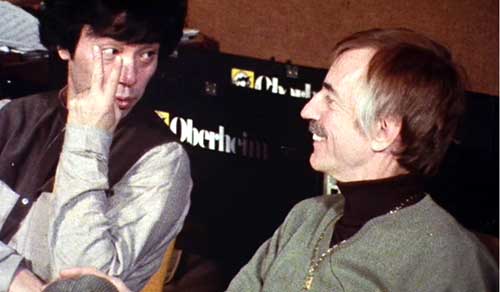
Paul Mauriat and Masuo Ikeda at Studio des Dames in Paris, 1982
Dmitry: What influence he have had on the J-pop?
Abramoff: He may not have had any direct impact on J-Pop, but Paul did change the concert scene in Japan. Up until his time, people in Japan once they graduated from their university and joined a company and put on a necktie, they stopped going to concerts. However, Paul’s concerts drew older people and families. They even drew three generations – grandparents, parents and children.
Dmitry: According to American Billboard magazine Paul Mauriat was awarded by the one gold disc in 1972 for the album "Penelope" and another gold disc in 1979 for the "Pegase" and "Mizuiro no ame". How much he awarded prizes for other successful recordings, such as "El bimbo"?
Abramoff: I do not remember how many gold albums Paul received in Japan. However, I do remember that at Nippon Phonogram we sold more than 20 million albums of the Paul Mauriat Orchestra over the years in Japan.
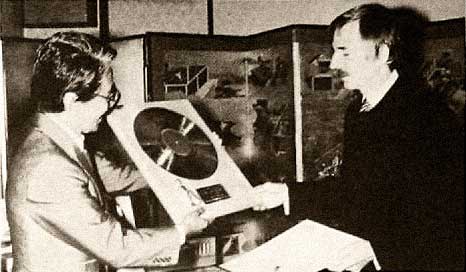 During Japanese tour '1979 Paul Mauriat receives a gold disk from Nippon Phonogram president, Nobuya Itoh, for Japanese sales action on the orchestra leader's "Pegase" and "Mizuiro no ame" albums
During Japanese tour '1979 Paul Mauriat receives a gold disk from Nippon Phonogram president, Nobuya Itoh, for Japanese sales action on the orchestra leader's "Pegase" and "Mizuiro no ame" albums
Dmitry: For how much number of sold albums the artist was awarded a gold disc in Japan?
Abramoff: Although there is an industry-wide standard for gold albums now in Japan, during the years when...
Dmitry: On your opinion, will Paul Mauriat always be alive in the people's hearts in Japan?
Abramoff: I definitely think so. Paul’s music is still heard on tv, radio, in-stores and other places in Japan and his music will always be with people in Japan.

